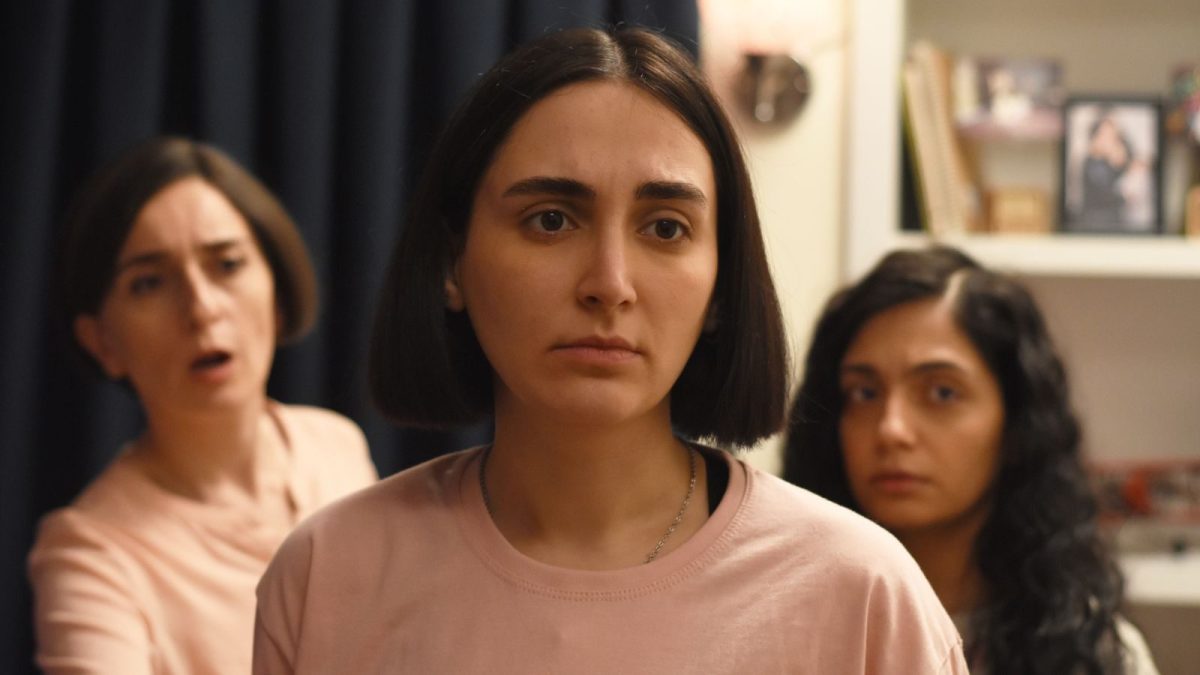Last May, just a week before winning the Special Award in Cannes, director Mohammad Hasoulouf was sentenced by Iranian authorities to eight years in prison, whipping, a fine and confiscation of property. This is not the first time Hasoulouf was convicted. In 2010, he was arrested for allegedly filming without a permit, and again in 2020 when his film “A Man of Integrity” was labeled a “collusion of national security and of propaganda against the system,” according to the human rights lawyer representing him. It is no exaggeration to say that his latest feature, “The Seed of the Sacred Fig,” which will be screened at the New York Film Festival this year, was miraculously completed in secret. Moreover, it’s a joy to celebrate the powerful political message and artistic achievements.
The movie tells the story of Iman (Missagh Zareh), whose promotion as judge investigator coincides with the 2022 civil protests against the Iranian regime. These protests were sparked by the death of 22-year-old Masha Amini, who was tortured and killed for allegedly wearing her Islamic headscarf improperly. At home, Iman’s family lives in a somewhat parallel reality: devoted wife Najmeh (Sosheila Golestani) and their two liberated daughters, Rezvan (Masha Rostani) and Sana (Setareh Maleki), are found protected from the unrest outside their apartment. Their stability starts slipping through the cracks when Iman’s gun disappears one day—causing him to descend into paranoia at the risk of being imprisoned for three years and having his reputation ruined.
The film’s success is credited to two main factors: the talented ensemble cast—many of whom have been prohibited from leaving Iran—and the screenplay. Throughout its two-and-a-half-hour runtime, “The Seed of the Sacred Fig” pierces through the gaps of each character to reflect the larger conflict in Iran. The influx points of a conservative family being liberated from strangling dogmas has already been observed in many movies. Still, here, Mr. Hasoulouf does not rely on predictable mannerisms, stereotypes of Arab families, or even rebellious teenagers. Instead, the film takes time to show people who are sometimes dubious and sometimes empathetic.
Iman, the presumed loving father figure, becomes more and more unstable as the story progresses; this disintegration of character is slowly paired with the violent and cruel nature of his work to the Iranian Revolutionary Court—which includes sentencing people to their deaths.
His aggressiveness, caused by the gun’s disappearance, also mirrors the current Iranian theocracy, which assumes the most effective way to shut down the voice of revolution is ongoing intimidation. An eerie interrogation scene shows that the escalation until that event is already absurd and confirms the unreliability of both Iman’s and the government’s judgment.
Most of the time, his wife, Najmeh, is on his side, powerfully portrayed by actress Sosheila Golestani. Namjeh is a rigid woman faithful to her husband and the government. Very early in the story, she reluctantly rescues her daughter’s friend, who was brutally injured after a protest. It’s a breaking point for Najmeh, where the reality of police brutality is not confined to news reports but is now bleeding, quite literally, into her own home.
In the girl’s bedroom hangs a portrait that states, “Never Ever Give Up,” a subtle message of support to young people. As Najmeh states at a certain point, “They are shouting from our building,” but Razvan and Sana are aware of the systematic oppression they face—both at home and outside of the small apartment they reside. Through curiosity and naiveness, they embark on the risky journey of liberation. Regrettably, the film relies too much on scenes of confrontation that become a bit repetitive by the second half of the movie.
When Iman corners Najmeh and her daughters, they must decide: either comply with the old generational order that is slowly losing its power or accept the invitation of a new future that could mean a dangerous labyrinth of questions to find its own right to freedom. Hasoulouf finally narrows down the spotlight on the women of the family, who may not hold the final authority in a conservative society but are the ones who can cause such a system to crumble under its own feet.
The last act, unfortunately, feels rushed and a bit underwhelming. After nearly three hours of runtime, audiences might find themselves wanting a more impactful ending. Still, “The Seed of the Sacred Fig” shines thanks to a talented cast, sharp dialogue, intense moments and humor at times. Despite the threat of retaliation from Iranian authorities, the film doesn’t hold back in delivering its message: the old regime will collapse under its weight. One can assume Hassoulouf firmly believes that true freedom will bloom once what strangles its people finally crumbles.
“The Seed of the Sacred Fig” will be screened at the New York Film Festival on Monday, Sep. 30 and Tuesday, Oct. 1. The film opens at the Lincoln Center on Nov. 27. Tickets are available now.
Rating: 4.5/5







